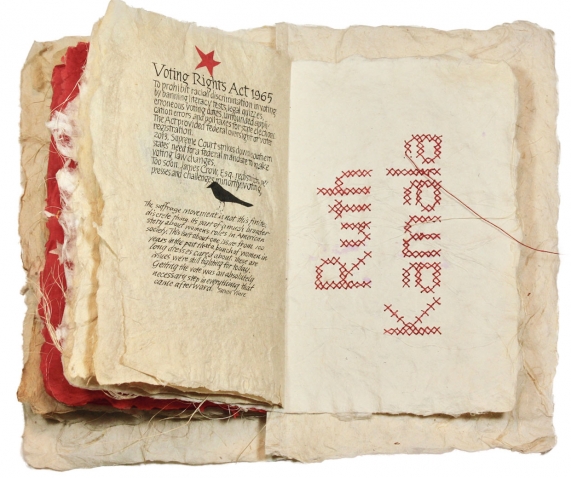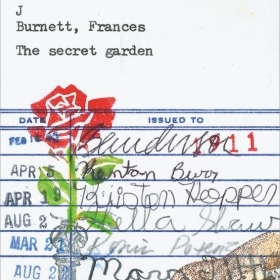Mending the Stars & Stripes, 2020, 11 by 6.5 by 1 inch, 32 pages; ink, gouache, and acrylic, linen thread on Kate FairChild handmade paper
Jan Owen’s artist’s book Mending the Stars & Stripes came into existence last year through a confluence of historic events. For much of 2020, Owen was isolated at her home in Belfast, Maine, and, like many artists, she opted to create work using materials she had on hand. 2020 also marked the 100th anniversary of the 19th Amendment. Wanting to celebrate the anniversary, Owen created this 32-page book.
The book’s fibrous, handmade paper, which includes loose threads that evoke the themes of women’s work and mending, has been meticulously inscribed with items including quotes in calligraphy from suffragists and civil rights activists, an intricate map of the United States with the years that territories and states gave women the right to vote, and cross-stitched names of women who fought for the cause.
Ruth R. Rogers, the curator of Special Collections at Wellesley, learned about the book directly from the artist, who has three other works in the College’s collection. “I’m always looking for items that fit the curriculum, that would speak to students, and would complement other books that I’m showing for coursework. Of course, this being about American political history and women’s suffrage, it seemed like the perfect blend,” Rogers says.
Rogers plans to show students Owen’s piece alongside the College’s copy of History of Woman Suffrage edited by Elizabeth Cady Stanton, Susan B. Anthony, and Matilda Gage, with Susan B. Anthony’s autographed inscription to the Wellesley College Library. The inscription reads, in part, “With the hopes that every student will study and learn the facts of the great work that has been done to make the world the better for the women of today.”
In another bit of Wellesley serendipity, Owen’s book includes a quote from historian Susan Wolfe Ware ’72 that appeared in a New York Times article about the anniversary of the 19th Amendment: “The suffrage movement is not this finite, discrete thing. It’s part of a much broader story about women’s roles in American society. This isn’t about one issue from 100 years in the past that a bunch of women in long dresses cared about. These are issues we’re still fighting for today. Getting the vote was an absolutely necessary step in everything that came afterward.”
Owen’s book echoes Ware’s assertion, incorporating events after the 19th Amendment, including the Indian Citizenship Act of 1924, the Chinese Exclusion Repeal Act of 1943, and the Voting Rights Act of 1965. The book ends with two cross-stitched names: “Ruth,” for Ruth Bader Ginsburg, who died while Owen was making the book, and “Kamala,” for Kamala Harris, the first female vice president and the first African American and first Asian American vice president. “We have come a long way, and yet, as we can see today, it’s not over yet,” Owen said in an interview with the magazine. “I could [create] book two of what voter suppression is happening right now.” She also notes that she deliberately left a long thread hanging from Harris’s name, implying the history yet to be written. “She’s not finished yet,” Owen says.








We ask that those who engage in Wellesley magazine's online community act with honesty, integrity, and respect. (Remember the honor code, alums?) We reserve the right to remove comments by impersonators or comments that are not civil and relevant to the subject at hand. By posting here, you are permitting Wellesley magazine to edit and republish your comment in all media. Please remember that all posts are public.